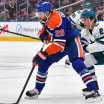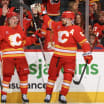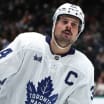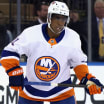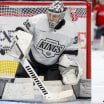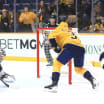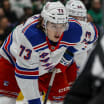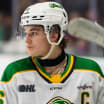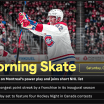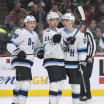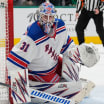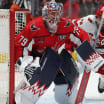Paddock talks expected 2023 NHL Draft top pick Bedard in Q&A with NHL.com
Regina coach calls working with star prospect 'once in a lifetime experience'
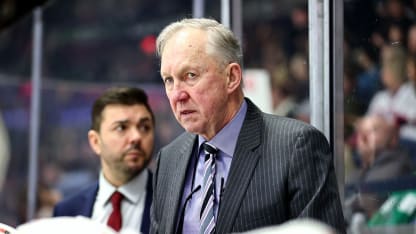
© Keith Hershmiller, Regina
REGINA, Saskatchewan -- John Paddock has spent the past nine seasons with Regina of the Western Hockey League, including six seasons as coach, and even he is at a loss for words to describe the impact center Connor Bedard has had.
"He's a once in a lifetime experience," Paddock said. "And I certainly have never seen a player like Connor at the junior level in my time coaching in the WHL.
"He's going to be what people expect. What is that for sure? Generational ... whatever words might do it. I mean, all you have to do is look at the World Junior Championship when he scored 23 points (nine goals, 14 assists in seven games). Connor McDavid and Sidney Crosby had 11 and nine points (respectively) in their final World Junior tournament."
Paddock has spent more than five decades in hockey, including multiple stints as a player, coach and general manager in the Western Hockey League, American Hockey League and NHL. He's also overcome cancer (lymphoma) and a bout with COVID-19 at the end of the 2021-22 season.
With last night's victory, John Paddock recorded his 207th career win behind the Pats bench: the 2nd-most in franchise history!
— Regina Pats (@WHLPats) March 16, 2023
Congrats Pads! 👏#LegendsInTheMaking pic.twitter.com/By3DuO6JwU
He moved into second place on Regina's all-time coaching list with his 207th victory in a 6-3 win against Brandon on March 15. Bedard, Regina's captain, presented Paddock the game puck after the win. Bob Turner (1965-77) is Regina's leader with 274 wins.
"It means a lot," Paddock said. "Not necessarily the wins but the longevity of being here. The confidence and the trust that ownership has in me is pretty special. This time last year I was in really rough shape. So it's a huge thing because of what was happening a year ago. Connor gave me the puck after the win, and I appreciated it and thank God I got another chance."
The hype surrounding Bedard during his three seasons with Regina in a way has energized Paddock's spirit and enthusiasm.
"He's on that path," Paddock said with a smile. "I coached Teemu Selanne in his NHL rookie year (Winnipeg Jets, 1992-93) and he scored 76 goals. Daniel Alfredsson (from 2005-08) and Zdeno Chara (2005-06) when I was with the Ottawa Senators ... they were so dialed in all the time. I see some of the traits Connor has that were also in those guys and they're Hockey Hall of Famers. To see somebody like this at this level ... I might not be alive in 20 years when his career is over, but it'll be something."
NHL.com caught up with Paddock on a recent visit to Regina to discuss the impact of Bedard, his coaching career, thoughts on the NHL and more.
How would you describe Bedard as a leader?
"I think he just naturally drags people along. They see his routine or his habits and they follow that. As a 17-year-old, I think he's respectively quiet but he's the captain and 17-year-olds aren't usually the captain. I mean, center Sam Steel (Minnesota Wild) was a top player for us and was a captain his last season in Regina (2017-18, age 19). Connor's not naturally loud but I think he has respect from everyone with the way he practices, how he plays, how he prepares. That, to me, is a big form of leadership and probably his best form at this time."
What is his best offensive attribute? His shot? His hockey IQ?
"Everybody sees the shot ... it's something he's worked on for a long time. But I think his ability to see the ice and make plays is right there. In three seasons with Regina, his goal and assist totals are pretty even (133 goals, 136 assists), so that's a pretty big statement, just like when he uses that shot and rips two or three in a game is a pretty big statement. For me, it's a toss-up because he can make a lot of plays."
Is there anything specifically Bedard wants to work on with you during video sessions?
"I think for him, which is normal for this type of level player, if something isn't working, he wants to talk about it. It's such a different level to try and explain ... we talked to him about playing without the puck, and while he doesn't ask to see that specifically, he does want to see where he could be on the ice offensively. He wants to know why and how the circumstances change if something doesn't work. Just situational things and how different teams play him. Lately, on the power play, teams are playing three guys high (against him). We tried to say take what's given to you, but it's not quite that easy because you only have one or two seconds to react. If three guys are on you, there's got to be someone open down low and that player has to be off to the side and not necessarily net front. He wants to know why something's not working if it's not, what he should do differently. But it's varied circumstances."
Do you see an edginess in his game that maybe isn't talked about enough?
"I've seen him make shoulder-to-shoulder hits many times. He's very competitive, period. He doesn't shy from physical play. He goes into some dirty areas with the thought of trying to draw a penalty or deliver a hit. He's more frustrated when we haven't beaten a certain team, we haven't won or played good enough to win. Playing physical doesn't frustrate him."
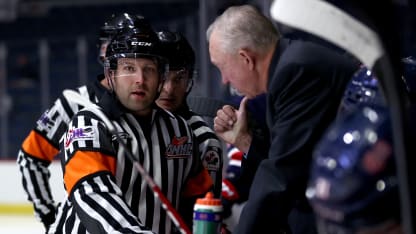
© Keith Hershmiller, Regina
Why do you enjoy coaching at this level so much?
"I enjoy coaching, period. The NHL has passed me by, but this is the closest thing to playing at any level. Your decisions have something to do with the outcome of the game, whereas in management, if you want your team to win, things don't happen between 7 and 9:30 at night. In management, you have to make a trade to help your team. I've had a great experience here and great support from ownership, so I've appreciated that."
Do you feel the NHL is in a good place when you watch the game today?
"I think for the most part, yes. I think it's a little bit more exciting than it was a few years ago with the number of goals scored. There are so many younger players having an impact; the talent is so good. That's very visible. But I never want to see our sport lose the team aspect. I think that's what it has that's so great. It's one of the big things with hockey. You know, basketball to me can be more individual than a team in winning it all in the end. But with these multitalented guys ... I'd urge coaches to try and push and urge their players to always be team first. It's a recipe for success."
You've coached and played with so many great players throughout your career. Can you give me four that were most memorable?
"I think so. Chara had some stubbornness to him, different little things, but he was so driven, absolutely focused on being at his very best every night. He did everything he could for his mind and his body in order to be like that every night. Players like Jason Spezza and Alfredsson; 'Spez' had a little bit of a bad reputation when he first came in about different things, but he just had to learn. He matured and doing what he did with the Toronto Maple Leafs as a player, to now in management (Maple Leafs special assistant to the general manager), it's been great to watch. I don't think people understood him completely. 'Alfie' was a great leader and player. As far as teammates, someone like [Philadelphia Flyers Hall of Fame forward Bobby Clarke] ... what he put into the game. 'Clarkie' did everything he could to win every game, and that's how he played. Every game was life or death and he prepared for it that way. So for me, those guys were all unique in their own way."
Photos: Keith Hershmiller, Regina
